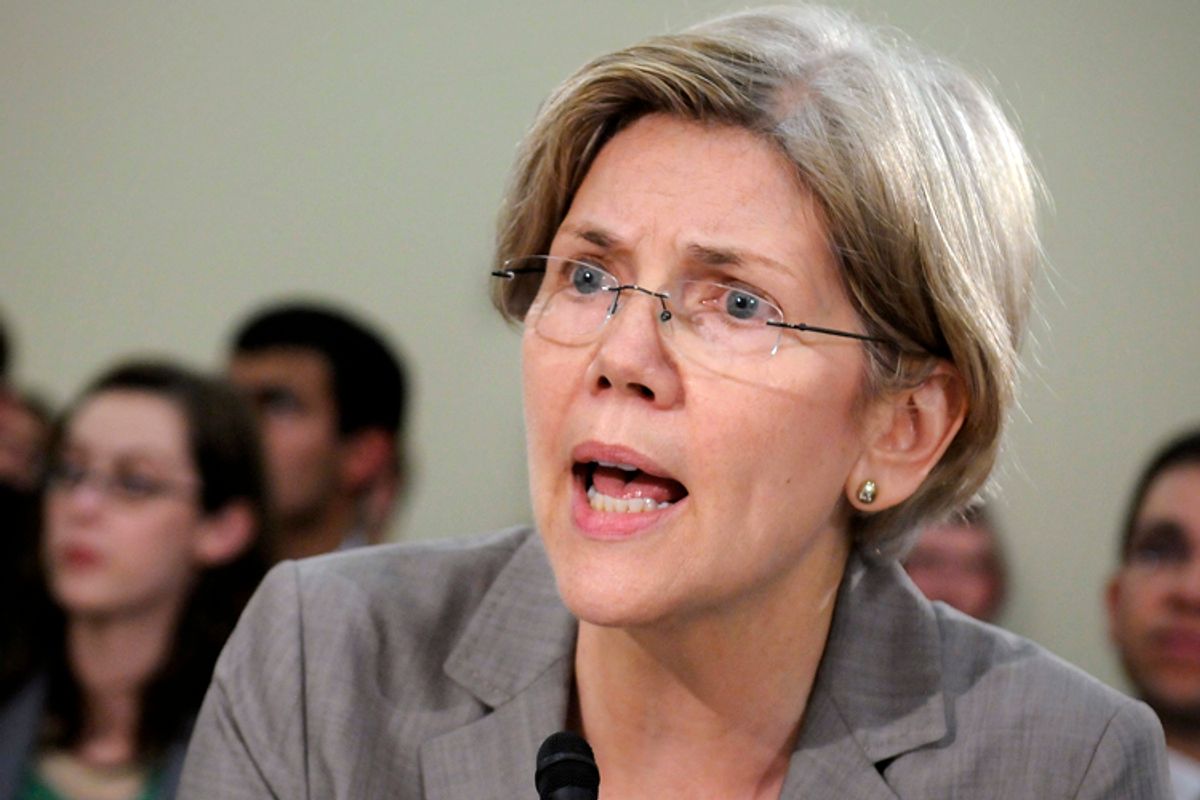 From her work on bankruptcy laws and her books on America's squeezed middle class, to her role as TARP watchdog and creator of the Consumer Financial Protection Bureau, to her latest turn as U.S. senator, Elizabeth Warren has set herself firmly on the side of hard-working people and against financial predators. In a must-read new book, A Fighting Chance, Senator Warren tells the story of her modest upbringing in Oklahoma, where she saw firsthand how working families struggle, and recounts her career trajectory from teacher to law professor to Washington powerhouse, where she has taken on the most formidable financial force on Earth, the American banking system. Senator Warren shares with AlterNet the thinking behind her new book and its key themes, as well as its connection to another must-read, Thomas Piketty's Capital in the 21st Century.
From her work on bankruptcy laws and her books on America's squeezed middle class, to her role as TARP watchdog and creator of the Consumer Financial Protection Bureau, to her latest turn as U.S. senator, Elizabeth Warren has set herself firmly on the side of hard-working people and against financial predators. In a must-read new book, A Fighting Chance, Senator Warren tells the story of her modest upbringing in Oklahoma, where she saw firsthand how working families struggle, and recounts her career trajectory from teacher to law professor to Washington powerhouse, where she has taken on the most formidable financial force on Earth, the American banking system. Senator Warren shares with AlterNet the thinking behind her new book and its key themes, as well as its connection to another must-read, Thomas Piketty's Capital in the 21st Century.
Lynn Parramore: What prompted you to write this book?
Elizabeth Warren: I grew up in a family that nearly lost everything, but I ended up in the United States Senate because I grew up in an America that invested in kids like me and built a real future for us. This book is an eyewitness account of how the playing field has been tilted since then, and about fighting back. It’s about losing and winning and getting stronger along the way.
I wrote this book because I know we can do better, I know we can invest in our kids and in research and infrastructure to build a future, instead of more loopholes and special deals for billionaires and big corporations. I’m doing everything I can to get out there and talk about that.
LP: Recent research has revealed that America’s middle class is no longer the world’s most affluent. In your view, what has contributed most to its decline?
EW: The foundations of America's middle class have been shaky for years, but the increasing economic fragility of working families wasn't inevitable. It is the direct consequence of deliberate choices Washington has made over the past generation to put the rich and powerful first and to leave behind working people. Washington is rigged for the big corporations that can hire armies of lobbyists and lawyers, and middle-class families have paid a huge price for that. It’s a real problem.
LP: French economist Thomas Piketty’s book Capital in the 21st Century has struck a nerve with its focus on growing inequality. How does Piketty’s research connect with your own writing and research about the forces operating against ordinary people?
EW: Thomas Piketty assembles the facts to prove a central point about trickle-down economics: Doesn't work. Never did. He has cold, hard data showing how the rich keep getting richer and how the playing field is rigged against working families. But he also shows that government policies to invest in the middle class and help everyone have opportunities can make a real difference. My research has led me to the same conclusions, and I agree strongly with him.
LP: One of the key themes in your book is that the system is rigged, and that bankers and plutocrats are doing the rigging. How can our elected representatives effectively challenge these forces within a system that depends so heavily on their contributions?
EW: I've seen Washington up close for years now, as I talk about in the book. What I've learned is that real change is very, very hard. But I've also learned that change is possible -- IF you fight for it. We learned that in the fight for the Consumer Financial Protection Bureau. I remember when everyone thought that idea was just a pipe dream. But we got out there, we organized, and we fought for it. Now there's a new consumer agency that has already returned $3 billion to families that were cheated.
LP: What are some of the most important things we can do to restore “A Fighting Chance” for regular people?
EW: We know how to strengthen the middle class because we have done it before. The pieces are straightforward: Tackle the student loan problem that is crushing our kids, leaving them with staggering amounts of debts as they work to start their lives. Invest again in roads and bridges, in our power grids and basic research. Pay for those investments by putting an end to the tax loopholes and subsidies that go to powerful corporations and the wealthiest Americans. Make sure that everyone follows the rules -- even big bank CEOs – so that our marketplaces are fair and safe again.
Most of all, get involved. Big corporations have money and power to make sure every rule breaks their way; people have voices and votes to push back. It’s up to us to make sure that every kid gets a fighting chance.

Shares